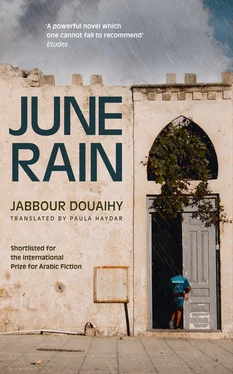‘She’s inside.’ He was answering without raising his head from the piece of leather he was working with, believing I was the one asking about Husneh. When he noticed the man standing in the doorway holding a rifle, he stopped cutting and sewing the pieces of leather.
Everyone knew Husneh, to the point that people used to call Abboud ‘Abboud Husneh’ after his wife. They called him that when he wasn’t around and sometimes in front of him, too, since they thought he couldn’t hear. Husneh made all the decisions about everything — the house, the children, and she even categorised the customers according to who could be trusted to pay later and who couldn’t. All she lacked was to give advice about how to make shoes, too.
‘What’s Husneh doing?’ the armed man asked. The two guests of the cobbler shop exchanged glances with each other. I shouted into the ear of Abboud who was looking perplexedly at the source of that question. Abboud was going to be the first man ever to be asked by a stranger, ‘What’s your wife doing?’
Those were difficult times. Little kids carried weapons as did some strangers, too. Abboud felt he had to answer, so he faced me and said, ‘I don’t know, maybe she’s nursing the baby.’
He said it somewhat sharply, surrendering to the strangeness of the question. Abboud had said it loud enough that I didn’t have to repeat it for the man holding the rifle. Actually, the man with the rifle strapped to his shoulder looked like he was going quail hunting up on Amiriyya hill at sunset. He seemed to have stopped in at the cobbler shop on his way, the way lots of people stopped in every day, to order some shoes or just to join the open forum. He seemed to be asking just to ask. The deaf Abboud answered him, so he didn’t make a move and didn’t ask the next question.
Abboud stopped what he was doing, waiting for the next question. He might have thought the man added something that he hadn’t been able to hear, so he looked at me inquisitively but I gave him a blank look. The man didn’t look like he’d asked anything and was waiting for a reply. He was waiting for something else. He turned his back to the shop and looked towards the deserted main street. Perhaps he was unsure what his next step should be.
In his hand was a list of names. Women’s names. He looked at it as if he detested the mission he had been given. Husneh’s name was at the top of the list. The rifleman smiled and bared his teeth when he read it and showed it to us: Husneh, wife of Abboud Husneh.
I don’t think she was nursing the baby at that time, but rather was planning lunch. Seven people plus me. They fed me with them sometimes, especially during those days of fighting so I wouldn’t move around too much by going home at noon and then coming back to the cobbler shop. That would have been an unnecessary risk. She made good food, Husneh, and I’d guess in the end she would choose the easiest solution: lentils, chickpea kibbeh and fried onions and potatoes. It was Friday. Before the fighting started she used to buy fish on Fridays, but the fish sellers stopped bringing baskets of fresh fish up from Al-Mina in Tripoli.
Whenever Abboud was asked about Husneh he said she was nursing the baby, as if the baby never stopped nursing, or maybe that was what he hoped so that the baby would grow quickly. The baby wasn’t yet four months old, but Abboud was bent on forbidding his wife from weaning him until he could walk, so he could walk over and nurse on his mother’s breast, go run off and play with his friends and come back again to his mother’s breast. His mother told him he had done the same thing when he was a child.
He named his son Raouf.
He was Abboud’s first son… and last, too, most likely, after four daughters. The day they rushed to bring him the news, Abboud knocked at his neighbour’s door and asked if he could borrow his rifle. He fired seven shots and then returned it.
Abboud couldn’t hear the child if he cried, but he certainly was able to dole out orders incessantly to his two oldest daughters and their mother.
‘Pick him up!’
‘Take him outside a little, let him get some sunshine.’
‘Change his nappies…’
Abboud was a boring pest, a parasite. He could never look at his only son without finding something that needed to be done for him. He behaved like a tough guy around the house, but now in his shop he just sat there on his cobbler’s chair not moving an inch. He didn’t do anything about the armed man standing there in his doorway asking about his wife.
He hid behind his deafness. Abboud was completely deaf or nearly so and possibly the most famous deaf man in town. He was persuaded to use a hearing aid only after I stopped working at his shop and opened my own. Just a few years before he died he had finally agreed to using a hearing aid, but it irritated him quite a bit with all the sudden buzzing and whistling sounds it made, so he would only put up with it for a few minutes, preferring instead the quietness and isolation of deafness he’d grown accustomed to.
In spite of all that, people accused him of only hearing what he wanted to hear. That was his reputation at least, and I thought they were right. They used to test him, too. They’d curse at him in a very soft voice and he’d retaliate with a harsher curse. Even though he couldn’t hear them when they spoke, he could always tell when they were cursing him. From merely noticing the semblance of a smile on my face he knew whoever was standing there talking to him was mocking him and so he’d respond however he saw fit in order to defend himself.
All of a sudden, the man holding the rifle turned back around toward the door of the shop and said, ‘We need her!’ He said it while pointing to an unspecified place off to the east. In other words, he wasn’t the one who needed her, they did, them over there.
This time Abboud heard even though the man hadn’t raised his voice any higher than before. I didn’t have to shout in his ear.
The armed man didn’t get animated. It was more like he was confused by his own actions.
It was more than likely he’d been told that the women on his list were sending messages to their relatives in the Lower Quarter and were leading the enemy to us, that the women were spies in our midst that we must get rid of.
A lot of time passed while he stood there with his back to the shop absent-mindedly looking off into the horizon, his view blocked by a dilapidated house and some fallow land. We resumed our conversation.
Abboud’s shop was the place where the townspeople assembled for the final word on the talk of the town. Whenever anyone heard anything, he would come to the shop to have it confirmed. And anyone who had an opinion to express came to the shop to make it known. We often ran out of chairs, leaving some people to remain standing.
The situation was going to last a long time, they were saying. The headline of the newspaper tossed onto one of the chairs said that the search for solutions was getting closer.
The Americans were participating in the solution. Ever since that point in history the Americans have been behind much of what goes on in this country. Camille Chamoun wasn’t going to succeed in his bid for a term extension. They commander of the army was mentioned as a possible successor.
Abboud resumed his work, poring over the shoe in his hand once again.
He signalled for me to go back to driving the thin nails into the circle of leather.
We used to talk politics or the news of the night before, whether it had been a harsh one or calm one. The topic of weapons cropped up suddenly, as it did every time. Everyone was an expert on guns, even people like us in Abboud’s cobbler shop who were unable to fight.
There was praise for the semi-automatic rifle, which shot only one bullet at a time. But there was no substitute for it for long range and for high-precision targets. It could penetrate the trunk of a poplar tree.
Читать дальше












